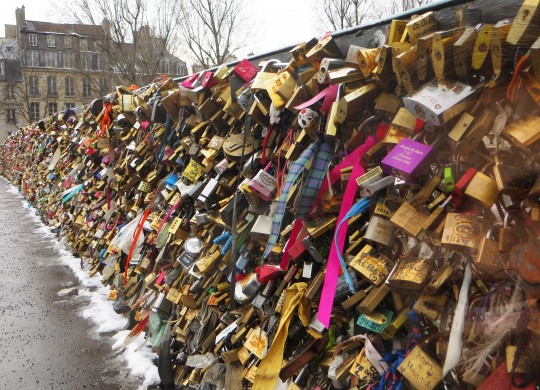Lovelocked?

Pont de l’Archevêché (The Archbishop’s Bridge) crosses the Seine in Paris, right next to the Notre-Dame Cathedral.
The striking thing about this bridge is the padlocks affixed to its rails, a practice becoming increasingly common around the world. They do it in China (probably where it originated), Japan, Russia, South Korea, in several places in Europe—including at least three bridges in Paris—and even in Australia, Canada, and in the U.S. (Guam, primarily, though also in Utah, and recently, in Chicago, and on New York’s Brooklyn Bridge).
“Love padlocks” they are called. Tethered to public structures like bridges, fences, and gates by sweethearts wanting to affirm and symbolize their love for one another (as long as the lock stays on, apparently).
Those responsible for the upkeep of ye olde city, Paris, weren’t impressed. “What about the architectural integrity of the Parisian landscape?” they asked. A few years ago, someone cut through the wire fencing and removed all the locks. Alas, in vain. Within months, there were more love padlocks on the bridge than before.
Will they have learned to live with it, considering that Paris hosts over 25 million visitors every year, the denizens of Paris aren’t particularly taken with the concept. Rather than share the delight (albeit naïve) that the rest of the world’s Romeos and Juliets take in festooning their bridges, Parisians are irked. Not that some of these tiny bridges, like the Pont de l’Archevêché, may collapse under weight of foreigners’ love (or what passes for it). What bothers them more is the thought that a padlock could represent love!
One 23-year-old waiter in a Parisian café on the Left Bank, looking across the Notre-Dame, expostulated: “The fools! They haven’t understood a thing about love, have they?”
An opinion writer in the New York Times echoed that sentiment: “At the heart of love à la française lies the idea of freedom. To love truly is to want the other free, and this includes the freedom to walk away. Love is not about possession or property. Love is no prison where two people are each other’s slaves. Love is not a commodity, either. Love is not capitalist, it is revolutionary. If anything, true love shows you the way to selflessness.”
Whether you like it or not, the NY Times is, here, quite biblical.
“For God so loved the world,
that He gave His only begotten Son,
that whoever believes in Him shall not perish,
but have eternal life.”
John 3:16
God loved, and he gave … selflessly!
And he calls his people to so love, and to so give … selflessly.
We know love by this,
that He laid down His life for us;
and we ought to lay down our lives for the brethren.
1 John 3:16
This is a risky, dangerous business.
To love at all is to be vulnerable. Love anything, and your heart will certainly be wrung and possibly be broken. If you want to make sure of keeping it intact, you must give your heart to no one, not even to an animal. Wrap it carefully round with hobbies and little luxuries; avoid all entanglements; lock it up safe in the casket or coffin of your selfishness. But in that casket—safe, dark, motionless, airless—it will change. It will not be broken; it will become unbreakable, impenetrable, irredeemable. The alternative to tragedy, or at least to the risk of tragedy, is damnation. The only place outside Heaven where you can be perfectly safe from all the dangers and perturbations of love is Hell.”
C.S. Lewis, The Four Loves
No more padlocks!











 Abe Kuruvilla is the Carl E. Bates Professor of Christian Preaching at The Southern Baptist Theological Seminary (Louisville, KY), and a dermatologist in private practice. His passion is to explore, explain, and exemplify preaching.
Abe Kuruvilla is the Carl E. Bates Professor of Christian Preaching at The Southern Baptist Theological Seminary (Louisville, KY), and a dermatologist in private practice. His passion is to explore, explain, and exemplify preaching.